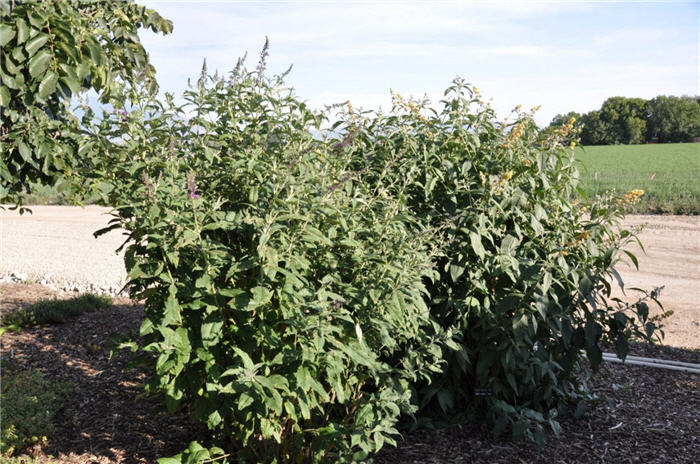| Botanical Name: Buddleja davidii 'Royal Red' | |
| Common Name: Royal Red Butterfly bush |

-
Anatomy
-
Culture
-
Design
Plant Type
Shrub
Height Range
3-6'
Flower Color
Purple, Red
Flower Season
Summer
Leaf Color
Grey Green
Bark Color
Brown, Grey
Fruit Color
n/a
Fruit Season
n/a
Sun
Full
Water
Medium
Growth Rate
Fast, Moderate
Soil Type
Sandy, Clay, Loam, Rocky, Unparticular
Soil Condition
Average, Rich, Poor, Well-drained, Dry
Soil pH
Neutral, Basic
Adverse Factors
Attracts Bees
Design Styles
English Cottage, Formal, Mediterranean, Ranch, Spanish
Accenting Features
Fragrance, Showy Flowers
Seasonal Interest
Summer
Location Uses
Entry, Perennial Border, Shrub Border, Foundation, Patio, Walls / Fences
Special Uses
Cut Flowers, Hedge, Screen, Mass Planting, Small Spaces
Attracts Wildlife
Hummingbirds, Butterflies
Information by: Stephanie Duer
Photographer:
Photographer:
-
Description
-
Notes
"Royal Red' is a lovely, smaller-scale buddleia, growing to about 4 to 5 feet tall and wide. It has large panicles of fragrant, magenta-purple flowers that bloom from June until September, sometimes even to the first frost. Attracts bees, hummingbirds, and butterflies; not so tasty to deer. Its smaller size make it easy to fit into the perennial, shrub, or foundation border.
Buddleia flower on new wood, so a hard pruning in late winter to early spring will encourage alot of branches and alot of flowers. Buddleia sometimes die-back in our colder winters, so prune hard to remove dead wood. If you want to try to keep your buddleia taller, when you prune, cut off the outward, arching branches, leaving the taller, central limbs in place. Attractive to bees, butterflies, and hummingbirds; resistent to deer. Grow in full sun to part shade, but best flowering occurs with full sun. Grow in well-drained soil; adaptive to soil types, from poor, dry soils to sandy-loam and clay-loam soils. A great cut flower.